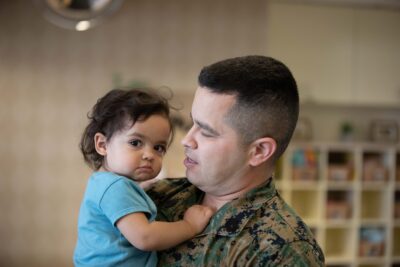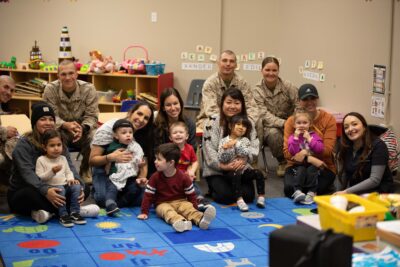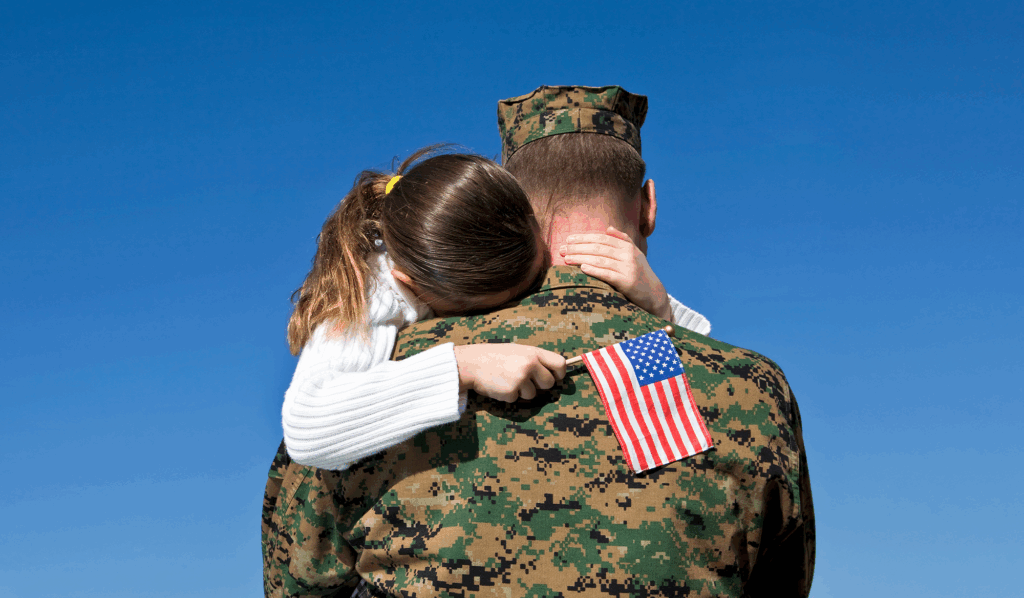RED DAY: Remembering Everyone Deployed
Written by Poli Dimitrova
RED Day — Remembering Everyone Deployed — is a time to honor the service and sacrifice of those who put their lives on the line for our country. From physical challenges faced abroad to emotional burdens at home, there is nothing easy about deployments. It is one of the most stressful times a military family can endure, filled with ups and downs, constant worries, and emotional and mental hardships.
What is RED Day?
As a military spouse of only three years, I must admit that I only recently learned about RED Day. Surprisingly, many of my fellow military spouse friends hadn’t heard of it either. I found this odd until I realized, through some research, that RED Day isn’t discussed enough. Let’s change that and explore what this day really means in military life.
We all know that moment — a phone call or look that signals deployment is coming. Sometimes, there are weeks or months to prepare; sometimes it comes with no notice at all. Either way, it’s one of the most challenging and life-changing events for any military family.
Whether your family is facing a deployment right now, is getting ready for one, or maybe you are lucky and there are no deployments scheduled on the calendar for the moment, let’s take a moment today and talk a little bit more about RED Day.
Known also as RED Friday, it honors all who’ve deployed — active duty and veterans alike. Let’s come together this Friday, May 16th, for RED Day and take the extra step to show support for both service members and their families.
The Reality of Deployment for Families

Thousands of military personnel are assigned for deployments every year, leaving millions of dependents behind. This experience is emotionally taxing for everyone — the service member, the spouse, and the children. Kids struggle with a parent’s absence, while spouses shoulder all the responsibilities. The service member is put under incredible physical pressure, dealing with a deployment, while also missing out on major milestones back home, as well as feeling disconnected and helpless.
Oftentimes, the lack of regular communication can lead to uncertainties, anxiety, and fear among all members of the family. Deployments mean sacrifices, resilience, and emotional endurance for military families. Not just a duty for the service member, but also a test of strength, patience, and emotional resilience for the entire family.
Coping During Deployments
Coping with deployments is never easy, even if you have experienced them multiple times. Here are some helpful strategies shared by fellow military spouses:
Establish a Routine
Creating a consistent routine brings stability and a sense of normalcy to your daily life. It helps you stay grounded and focused.
Stay Connected
Maintaining communication with your deployed service member benefits the mental well-being of everyone involved. If phone access is limited, write letters or emails. It may seem “old school,” but even years later, I still cherish the letters my husband and I exchanged during his deployments.
Set Goals and Stay Busy
This is my personal favorite strategy. The best way to make time fly is by keeping yourself busy. When my husband is away, I fill my calendar with activities and commitments. Deployments can also be a great opportunity to start a new hobby or focus on personal goals.
Use Military Resources
Take advantage of the support available to you. The Armed Services YMCA (ASYMCA) provides programs and resources tailored to support military families during challenging times.
Keep Kids Involved
Depending on their age and personality, many children benefit from being included in deployment routines. A countdown calendar can help them stay informed and provide a sense of awareness and security—both crucial while a parent is away.
Share Experiences from Afar
Over the years, through deployments and even a long-distance engagement, my husband and I have stayed connected by sharing experiences, like reading the same book at the same time. When we could talk, we would discuss the story; when we couldn’t, we would email each other updates or reactions. These days, you can also do this with podcasts or TV shows. It’s a great way to feel close, even while apart.
Finding Strength in Community
One of the biggest challenges for me as a military spouse, not only during multi-month deployments but even shorter couple of weeks training programs when my husband is away, is loneliness. Even basic routines suddenly feel heavier when you’re on your own.

I have had to go through that by myself in a new state, in a different country, away from any friends and family. I have also had to do it with a small baby in a familiar place, where we have friends and support. Either way, it’s equally difficult. The empty chair at dinner, the silence in the house, as well as carrying all the responsibilities, and trying to stay strong when you haven’t heard from your loved one in days or weeks — it all weighs heavily.
In such situations, it is easy to feel a deep sense of loneliness and isolation. That’s why community is so essential. Finding connections, talking to people, and “getting your mind off the deployment” (literally) are some of the best ways to make these challenging moments a bit more bearable. Sometimes it might feel difficult to even get out of the house, but the more you do it, the easier it gets. You just need to make that first step! Because once you find the community, you will understand that you are not alone. You will be able to speak again without your voice trembling, eyes watering, and feeling like you are about to burst into tears. You will share laughs with other military spouses, whose loved ones are also deployed, and you will find joy again in the one-on-one moments spent with your little children.
Finding community can be tough, but resources like the ASYMCA make it easier. With 12 branches across the U.S., they offer deployment support programs like:
Operation Hero
Even we as adults can find it difficult to comprehend the changes when a loved one is away on deployment. Let alone little ones who might be struggling to communicate their emotions or lack the skill set to deal with the unknown. Operation Hero can help military kids in grades 2-5 by discussing how to manage emotions, adapt to changes, and get back on track if they’ve been struggling at school.
Food and Emergency Assistance
Deployments are difficult enough without parents worrying about making ends meet. The ASYMCA also understands how challenging it is to provide nutritious meals on a single income in today’s economy. That’s where the Food and Emergency Assistance Programs come in, supporting military families. Reach out to your local ASYMCA branch to find out what resources are available to you and your family. ASYMCA is there to provide military support and help lift part of the burden so you can focus on what really matters.
How to Honor RED Day
Anyone can honor and show their respect toward service members, especially those deployed and away from their families. Here are a few easy ways:
- Wear red – A red shirt or even a small red accessory on Fridays is a meaningful way to observe RED Day.
- Share your story – If you’re comfortable, sharing your story online can be a great way to spread awareness and help others experiencing the same.
- RED Events – Many communities organize RED Day events or parades. Regardless of whether you want to just attend or even help plan one, these are good ways to show your support.
- Support a Military Family – If you have a neighbour who has a deployed loved one, you can offer help. Even the smallest gestures, like bringing a meal or stopping them and asking how they are feeling (but really listening), can mean more than you could imagine!
- Write Letters or Cards – Various organizations can help reach out to deployed troops. You can send thank you cards, short messages, or even kids’ drawings. My husband still remembers receiving lots of small cards and even birthday wishes during one of his deployments years ago. He didn’t know any of these people, but he still keeps all of the cards in his massive box of military memorabilia.
- Support Organizations like ASYMCA – The ASYMCA and other military support organizations exist to help deployed military members and their families. You can either donate or volunteer your time as a way to honor RED Day.
Each of us can take action to recognize the sacrifices of deployed service members. Wear red every Friday, share your story, or join an event. The ASYMCA will be honoring RED Day on Friday, May 16th this year with a 3X Flash Match, thanks to our partners at Aquarian. That means $1 = $3, tripling your impact to support military families during deployments.

